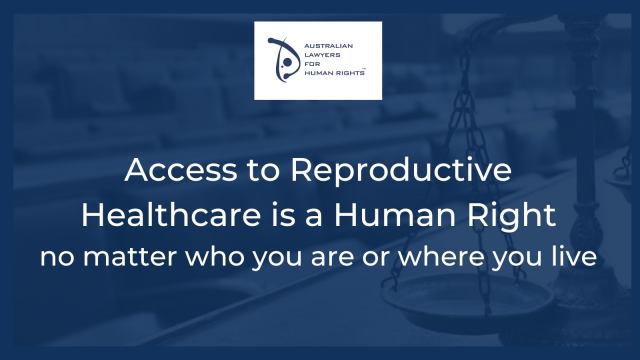Inquiry into Universal Access to Reproductive Healthcare

ALHR has made a submission to the Senate Standing Committee’s Inquiry into Universal Access to Reproductive Healthcare, welcoming the Federal Government’s commitment to dismantling barriers to universal access to reproductive healthcare.
Our submission highlights the international human rights law basis for universal access to reproductive healthcare, current barriers arising from the cost and accessibility of contraception and abortion services in Australia, as well as the urgent need to prevent forced sterilisation, contraception and replace substituted decision making.
Our submission recommends a range of reforms including that:
- The cost of contraception be subsidised to ensure that cost is not a barrier to access.
- Public hospitals under their funding arrangements should be required to provide contraception services.
- Training of health professionals should be directed to increasing knowledge of contraception, including long-acting reversible contraception.
- Community education should be directed to increasing understanding within the community about methods of contraception, including long-acting reversible contraception.
- Support and training should be provided for Aboriginal and Torres Strait Islander doctors, nurses, midwives and health workers to facilitate culturally safe healthcare and address staff shortages.
- Public hospitals under their funding arrangements be required to provide abortion services and not engage in conduct that discourages abortions
- The Therapeutic Goods Administration and Pharmaceutical Benefits Advisory Committee approvals should be amended to address the overregulation of medical abortion, including:
- the 63 day gestational limit;
- simplifying registration requirements for doctors and pharmacists; and
- expanding the range of providers of MS-2 Step to nurse practitioners and midwives.
- Increase training of health professionals in abortion care, both medical and surgical, to build expertise, address abortion stigma and increase services.
- Increasing public awareness of medical abortion and referral obligations of health professionals with a conscientious objection.
- Increase the training of health professionals with respect to the obligation to refer and investigate and sanction non-compliance.
- Increase the training of health professionals with respect to identifying reproductive coercion and supporting people in securing reproductive autonomy and access to healthcare.
- Australia urgently act on the recommendations of United Nations treaty bodies and:
- introduce national uniform legislation to ensure that the use of sterilisation, abortion and the administration of contraception can only be carried out with prior, free and fully informed consent; and
- take immediate steps to replace substitute decision-making with supported decision-making and repeal all legislation that authorises medical intervention without the free and informed consent of the persons concerned.
The ALHR welcomes the NWHS, the clear commitment to securing its implementation and the federal government’s commitment to the promotion of sexual and reproductive rights in domestic and foreign policy.
The vulnerability of sexual and reproductive rights has been laid bare in recent months by developments in the United States (US). Australia would appear to be far removed from the febrile legislative setting of the United States. Abortion remains a conscience vote issue and Prime Minister Anthony Albanese has observed that ‘[i]t is a good thing that in Australia, this is not a matter for political debate.’ But efforts to politicise sexual and reproductive healthcare have intensified in Australia, particularly with respect to abortion, alongside the highly damaging politicisation of healthcare for – and social inclusion of – transgender and non-binary people. In order to advance human rights and achieve the priorities of the NWHS, efforts to politicise healthcare access must be identified and repudiated.



